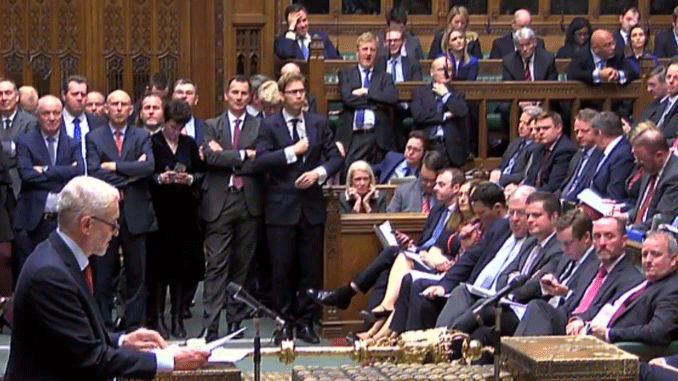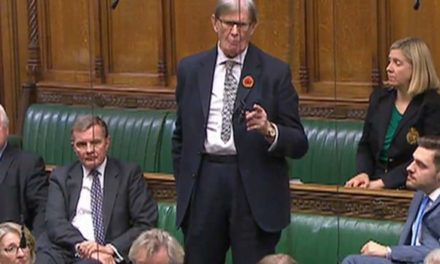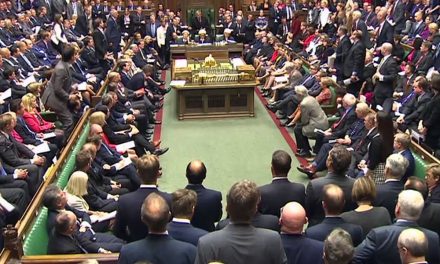The House of Commons failed for a second time yesterday to agree on an alternative to Theresa May’s Brexit deal. During the debate Sir William Cash made the following interventions:
Mr Speaker: I inform the House that I have not selected any of the amendments.
Motion made, and Question proposed,
(1) That, at today’s sitting –
(a) any proceedings governed by the order of the House of 27 March (Business of the House) or this order may be proceeded with until any hour, though opposed, and shall not be interrupted;
(b) the order of 27 March shall apply as if, at the end of paragraph 2(b), there were inserted “and then to motions in the name of a Minister of the Crown relating to statutory instruments”;
(c) notwithstanding the practice of the House, any motion on matters that have been the subject of a prior decision of the House in the current Session may be the subject of a decision;
(d) the Speaker shall announce his decision on which motions have been selected for decision by recorded vote before calling a Member to move a motion under paragraph 2(f) of the order of 27 March;
(e) the Speaker may not propose the question on any amendment to any motion subject to decision by recorded vote or on the previous question, and may not put any question under Standing Order No. 36 (Closure of debate) or Standing Order No. 163 (Motion to sit in private);
(f) debate on the motions having precedence under paragraph 2(f) of the order of 27 March may continue until 8.00 pm at which time the House shall proceed as if the question had been put on each motion selected by the Speaker for decision by recorded vote and the opinion of the Speaker as to the decision on each such question had been challenged;
(g) in respect of those questions –
(i) Members may record their votes on each question under arrangements made by the Speaker;
(ii) votes may be recorded for half an hour after the Speaker declares the period open and the Speaker shall suspend the House for that period;
(iii) the Speaker shall announce the results in the course of the sitting;
(h) during the period between 8.00 pm and the announcement of the results on the questions subject to recorded vote –
(i) no motion for the adjournment may be made;
(ii) the Speaker may suspend the sitting if any other business, including proceedings provided for in paragraph 1(b) of this order and paragraph 2(g) of the order of 27 March, has been concluded.
(2) That, on Wednesday 3 April –
(a) notwithstanding Standing Order No. 14(1) (which provides that Government business shall have precedence at every sitting save as provided in that order), precedence shall first be given to a motion relating to the Business of the House in connection with the United Kingdom’s withdrawal from the European Union
(b) if more than one motion relating to the Business of the House is tabled, the Speaker shall decide which motion shall have such precedence;
(c) the Speaker shall interrupt proceedings on any business having precedence before the Business of the House motion at 2.00 pm and call a Member to move that motion;
(d) debate on that motion may continue until 5.00 pm at which time the Speaker shall put the questions necessary to dispose of proceedings on that motion including the questions on amendments selected by the Speaker which may then be moved;
(e) any proceedings interrupted or superseded by this order may be resumed or (as the case may be) entered upon and proceeded with after the moment of interruption.—(Sir Oliver Letwin.)
(…)
Sir William Cash (Stone) (Con): A few days ago, I brought in the House of Commons (Precedence of Government Business) (European Union (Withdrawal) Act 2018) Bill, to which I gave a great deal of thought and that I discussed with many other Members. It is due to be debated on 5 April. The position is this. I did it because of my grave concern about the procedure being employed under this motion in particular, for the following reasons, which I will give briefly.
First, it is well said in our constitutional authorities that justice is to be found in the interstices of procedure. What that means is that through procedure we can ensure that things are done that should be done, based on conventions such as the reason for the rule, which is a fundamental basis of our constitutional arrangements.
Standing Order 14 is quite clear: it gives precedence to Government business. As a result of this procedure, we are impugning that rule and substituting for it a completely different arrangement—one that I have described as a constitutional revolution. It is not a novelty, as it was described just now, or, as the right hon. Member for Twickenham (Sir Vince Cable) said the other day, a technical innovation. The problem goes back to the reason for the rule and the Standing Order. Government business takes precedence for one simple reason: the Government are the Government of this country and are given that opportunity by virtue of the decisions taken by the public and the wishes of members of the public, as voters in general elections. That is the basis of our democracy. Likewise, decisions in referendums are taken by members of the public as voters.
It is utterly perverse for us to vote by such a significant majority—I will not go into that, because we know it is the case—and then overturn and invert the business of the House rules as we are doing under this business motion and as happened the other day. Government business takes precedence because of democracy. It is a fundamental question. Parliament decided in the European Union Referendum Act 2015 to give the decision to the British people, not to this House. I have said repeatedly—and it is true—that we operate on the basis of parliamentary government, not government by Parliament. If, by a sovereign Act of Parliament, we confer upon the British people the right to make that choice in a referendum, there is not, in terms of that Act, for which the House voted six to one, an opportunity then to take back control in this context.
It is a very simple question, and, to my knowledge, it has happened only once before. You mentioned the other day, Mr Speaker, or somebody raised with you, a precedent going back to 1604. As it happens, there is another precedent, from the 1650s, when the House became completely anarchic, and different factions started making decisions without reference to any Government policy—and look at the mess we are in now and the anarchy now prevailing, with these indicative votes and everybody making different decisions for no good purpose. Oliver Cromwell came down to this House and said, “You have been here too long for anything useful you may have done. Depart, I say, and in the name of God, go.” He then brought in the Barebone’s Parliament; that collapsed as well, and we ended up with a military dictatorship.
Members of Parliament voted for the referendum Act by six to one, for the European Union (Notification of Withdrawal) Act 2017 and then for the European Union (Withdrawal) Act 2018. As I say quite often, my right hon. and learned Friend the Member for Rushcliffe (Mr Clarke) himself voted for the Third Reading of the withdrawal Act. These indicative votes are just a means of trying to unravel the decision taken—that is the bottom line. I believe that it is undemocratic and in defiance of our constitution, our procedures and the reason for the rule. As far as I am concerned, these indicative votes are like a parliamentary bag of liquorice allsorts—or rather humbugs.
(…)
Sir William Cash: Does the hon. Lady agree that one problem with these indicative votes is that when they are attached, as they are intended to be, by all accounts, to a Bill that will then follow and be put through the House of Commons in one day—[Interruption.] Perhaps it will have one day in the House of Lords as well, for all I know. The bottom line is: we do not know yet what any such Bill will contain. It is inconceivable, is it not, that we should be presented with Bills that will be rammed through the House of Commons on matters of such incredible importance without even seeing them?
Kate Hoey: That just further adds to my view that we should be able to vote on whether we want another day or not after today’s business. We have to remember here, as do people watching, that Parliament abrogated its responsibility to take this decision—we have to say that over and over again—and asked the people. It said, “We will listen to whatever you say.” I do not care what anyone says, the dictionary definition of what “leave” means is very simple. All these motions today, with the exception of the one tabled by the hon. Member for Basildon and Billericay (Mr Baron), are designed, in some way or another, to not allow us to leave in the way that people thought they were voting for when they voted on 23 June 2016. It was made very clear—I do not want to go into the details—and we all knew that leave meant leaving all the institutions of the European Union. So I would never question it, but I am disappointed that we will not have a vote on the amendment, as that would have been sensible. I hope that today people remember that the biggest majority in this House for anything to do with the European Union was when 498 votes said we would leave, with or without a deal.
(…)
Mr Speaker: I can now announce the outcome of the Divisions on motions relating to the United Kingdom’s withdrawal from and future relationship with the European Union.
In respect of Mr Kenneth Clarke’s motion (C)—customs union—the Ayes were 273 and the Noes were 276, so the Noes have it.
In respect of Mr Nicholas Boles’s motion (D)—common market 2.0—the Ayes were 261 and the Noes were 282, so the Noes have it.
In respect of Mr Peter Kyle’s motion (E)—confirmatory public vote—the Ayes were 280 and the Noes were 292, so the Noes have it.
In respect of Joanna Cherry’s motion (G)—parliamentary supremacy—the Ayes were 191 and the Noes were 292, so the Noes have it.
The lists showing how hon. Members voted will be published in the usual way on the CommonsVotes app and website, and in Hansard.
(…)
Sir William Cash (Stone) (Con): On a point of order, Mr Speaker. In the light of the word “blockage” that was just used, and the suggestion that somehow or other there is something wrong with our democratic system, may I simply say this? I recall the fact that section 1 of the European Union (Withdrawal) Act 2018 quite clearly states, as a matter of law, that the European Communities Act 1972 is repealed on exit day, and if that exit day happens to be 12 April, so be it. That is the law of the land. That is something that we ought to hang on to, because it is the anchor of the referendum in which the British people voted.
Mr Speaker: I thank the hon. Gentleman. He has represented his own position correctly, and I know that because I have heard him make that point with comparable eloquence on several occasions. Whether he has entirely fairly characterised the position of the hon. Member for Hove (Peter Kyle), I do not know, but the hon. Gentleman will doubtless study the Official Report and make his own assessment.



